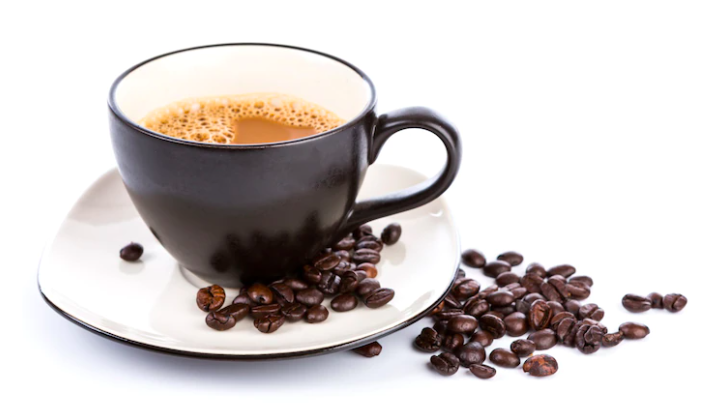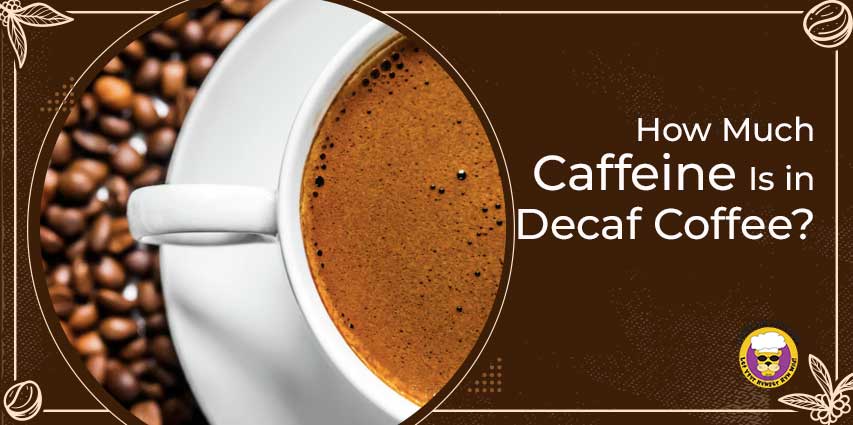Are you a fan of coffee, but looking for something that’s a bit lower in caffeine? You may be asking yourself “How much caffeine is in decaf coffee?”, and that’s an important question to answer for those interested in limiting their daily caffeine intake. Decaffeinated coffee varies greatly from regular brewed coffee when it comes to the amount of caffeine present, so it’s important to understand the specifics if you’re trying to make informed decisions about drinks containing this stimulant.
We’ll explore all the details here: what exactly is decaffeination; which brewing methods are most influential over the final product; and just how different decaffeinated brews can be when compared to normal caffeinated ones. Armed with knowledge on these topics, making informed choices becomes easier – read on!
What is Decaf Coffee?

Decaffeinated coffee, more commonly known as decaf, is a type of beverage made from the same roasted ground beans that regular brewed coffee comes from. The only difference between the two beverages lies in the way they are produced:
Decaffeinated coffees have undergone a process called decaffeination to reduce their caffeine content. This can be accomplished through a variety of methods, including water-based processes, chemical solvents, or certain natural compounds. Decaf coffees can still contain trace amounts of caffeine depending on the method used and the type of roasted beans.
What is Decaf Coffee Made?
The most commonly used methods for decaffeinating coffee beans include the water-based process, chemical solvents, and natural compounds. The water-based method involves steaming the beans to open their pores and then soaking them in hot water to extract the caffeine. Afterward, they are dried and roasted as per usual.
The chemical solvent method uses a chemical, such as ethyl acetate or methylene chloride, to bond with the caffeine molecules and extract them. This method may leave behind some traces of solvent in the final product. Finally, natural compounds such as coffee cherry husks or sugar cane fiber can be used to naturally decaffeinate beans without using any chemicals.
Related article:
Latte Vs Coffee – Which one is better?
How is Coffee Decaffeinated?
The process of decaffeinating coffee can vary depending on the method used, but all involve a few basic steps. The beans are first steamed to open their pores, then soaked in either hot water or a chemical solvent for several hours to extract the caffeine. In some cases, natural compounds may also be used. After this step, the beans are dried, roasted, and then ground to the desired consistency. The final product may contain trace amounts of caffeine depending on the method used and the type of beans chosen.
How Much Caffeine Is in Decaf Coffee?
Decaffeinated coffee can range from having no detectable levels of caffeine to containing traces of up to 2mg per cup. The amount of caffeine present in the final product depends on the type and quality of beans used, as well as the decaffeination method. Generally speaking, chemical solvents will result in a product that has lower levels of caffeine than those made with natural compounds or water-based processes.
Ultimately, if you are looking for a coffee with minimal caffeine content, it is best to purchase from a reliable source that is upfront about their decaffeination process.
How Much Decaf Coffee You Should Drink?
The amount of decaf coffee that you should drink depends on your individual tolerance and health goals. Some people may find it beneficial to limit their daily consumption of caffeine, while other individuals may find no need to do so. If you are looking to reduce your caffeine intake, it is recommended that you start by drinking a cup or two of decaf per day and gradually reduce your intake over time. It is also important to note that different brewing methods can influence the caffeine levels of the final product – so be sure to pay attention to how you are preparing your decaf coffee!
Overall, understanding the process of decaffeination and which brewing methods best suit your caffeine needs will help you make the most of your decaf coffee experience. As long as you pay attention to your individual tolerance and choose high-quality beans and brewing methods, decaf can be an enjoyable way to enjoy a caffeinated beverage without all the jitters associated with regular coffee.
What are the Benefits of Decaf Coffee?
Decaf coffee is a great choice for those looking to reduce their caffeine intake while still enjoying the flavor and aroma of coffee. Studies have also suggested that decaffeinated coffee can be beneficial when it comes to certain health conditions, such as diabetes, heartburn, and even cancer prevention.
Additionally, some research suggests that drinking decaf may help improve concentration, memory, and general mental clarity. Finally, decaffeinated coffee can be an excellent choice for those looking to reduce their risk of insomnia or other sleep disturbances associated with the consumption of regular caffeinated beverages.

How much caffeine is too much?
The amount of caffeine that is too much will vary from person to person. Generally speaking, it is not recommended to consume more than 400mg of caffeine per day for adults. Consuming more than this could increase the risk of experiencing side effects such as insomnia or jitteriness, as well as other negative health impacts.
If you are concerned about the amount of caffeine you are consuming, it is best to consult with your healthcare provider. Additionally, reducing your intake of caffeinated beverages and choosing decaffeinated alternatives can be a great way to ensure that you don’t exceed the recommended daily limit.
Who Should Drink Decaf Coffee?
Decaffeinated coffee can be a great choice for individuals who are looking to reduce their caffeine intake or for those with certain medical conditions that could be exacerbated by the consumption of regular coffee. Additionally, decaf coffee is an excellent option for pregnant women and children, as they may be more vulnerable to the side effects associated with too much caffeine.
Finally, decaf is a great choice for those who are looking to enjoy the flavor and aroma of coffee without experiencing any of the jitters or sleep disturbances associated with regular caffeinated beverages.
Why there’s caffeine in decaf coffee?
Although the decaffeination process reduces the caffeine content of the beans, there is still a small amount of natural caffeine left in the final product. This is because some of the naturally occurring caffeine molecules are not removed during decaffeination and can be extracted during brewing.
Caffeine in Decaf Espresso: Is there a Difference?
Yes, decaf espresso typically contains a higher amount of residual caffeine than regular drip or filter coffee. This is because the brewing process for espresso involves steeping the grounds at a much higher temperature and pressure for longer, which can extract more of the remaining caffeine molecules. It is recommended that those looking to reduce their caffeine intake opt for brewed decaf coffees instead of decaf espresso.
How to Choose the Best Decaf Coffee?
When selecting a decaffeinated coffee, it is important to look for high-quality beans that are properly labeled as decaffeinated.
Will Decaf Coffee Keep me Awake?
Decaf coffee still contains small amounts of caffeine, so it may have a mild energizing effect. However, the amount of caffeine in decaffeinated coffee is significantly lower than regular coffee, so it is unlikely to cause any harmful side effects such as insomnia or jitteriness. Additionally, if you choose a high-quality decaf coffee, it can provide a great flavor and aroma without the caffeine kick.
Ultimately, decaf coffee is an excellent choice for those looking to enjoy the taste of coffee without the energizing effects that come with regular caffeinated beverages. It is also typically much better for your overall health than regular coffee, as it provides many of the same benefits without the risk of excess caffeine intake.
Is Decaf Coffee Bad for You?
Decaffeinated coffee is not necessarily bad for you, as it still contains beneficial compounds such as antioxidants. However, some studies have suggested that consuming large amounts of decaf coffee over long periods of time can increase the risk of certain health conditions, including heart disease and type 2 diabetes. Therefore, it is important to consume decaf coffee in moderation and monitor your intake to ensure you aren’t consuming too much.
The Best Decaf Coffee Beans
When selecting the best decaf coffee beans, look for high-quality organic coffees that are sourced from trusted, sustainable farms. Additionally, it is important to make sure that the beans you choose have been properly decaffeinated using a safe and reliable method. Finally, opt for brands or roasters with transparent labeling so you can be sure that what you’re consuming is truly decaffeinated coffee.
FAQs
Q: How much caffeine is in decaf coffee?
A: The amount of caffeine in decaffeinated coffee varies depending on the type and quality of beans used, as well as the method of decaffeination. However, typically a cup of brewed decaf coffee contains about 3 to 15 milligrams of caffeine, compared to 95 to 200 milligrams of caffeine in a cup of regular coffee.
Q: Is it safe to drink decaf coffee?
A: Yes, decaffeinated coffee is generally considered safe to consume and can provide many of the same health benefits as regular coffee without the risk of excess caffeine intake. It is important to select high-quality, organic beans and to monitor your intake in order to ensure you aren’t consuming too much.
Q: What is the difference between regular coffee and decaf?
A: The main difference between regular and decaffeinated coffee is that the latter contains a significantly lower amount of caffeine.
Decaffeinated coffee also typically contains more beneficial compounds such as antioxidants, which can help protect against certain health conditions. Lastly, decaffeinated coffee is generally considered to have a smoother and sweeter taste than regular coffee.
Q: What should I look for when choosing decaf coffee beans?
A: When selecting the best decaf coffee beans, look for high-quality organic coffees that are sourced from trusted, sustainable farms.
Q: Can you feel caffeine in decaf coffee?
A: While decaffeinated coffee contains small amounts of caffeine, it is unlikely to cause any significant stimulating effects like regular coffee. However, those who are particularly sensitive to caffeine may notice a mild energizing effect from drinking decaf coffee.
Q: Is it OK to drink decaf coffee everyday?
A: Yes, it is generally safe to consume decaffeinated coffee on a daily basis. However, it is important to monitor your intake and make sure you are not consuming too much. Additionally, be sure to choose high-quality organic beans and look for brands or roasters with transparent labeling.
Q: How much caffeine is in a 12 oz decaf coffee?
A: The amount of caffeine in 12 ounces of decaf coffee varies depending on the type and quality of beans used, as well as the method of decaffeination. Generally, a cup of brewed decaf coffee contains about 3 to 15 milligrams of caffeine, compared to 95 to 200 milligrams of caffeine in a cup of regular coffee.
Q: Does decaf coffee have health benefits?
A: Yes, decaffeinated coffee may offer some of the same health benefits as regular coffee and may even contain more beneficial compounds such as antioxidants. However, it is important to consume decaf coffee in moderation and monitor your intake to ensure you aren’t consuming too much.
Q: Can you get 100% decaf coffee?
A: Yes, there are coffee roasters and brands that offer 100% decaffeinated coffees. When selecting such beans, look for high-quality organic coffees sourced from trusted, sustainable farms and make sure to read labels closely in order to be sure the coffee is truly decaffeinated.
Q: Will decaf coffee keep you awake?
A: While decaffeinated coffee contains small amounts of caffeine, it is unlikely to cause any significant stimulating effects like regular coffee would. Those who are particularly sensitive to caffeine may notice a mild energizing effect from drinking decaf coffee, but overall it should not keep you up at night.
Q: Why do people drink decaf?
A: Many people choose to drink decaf coffee for a variety of reasons. Some may be looking to reduce their caffeine intake in order to avoid potential side effects, while others may enjoy the taste of decaffeinated coffee without the stimulating effects of regular coffee.
Q: Can decaf make you sleepy?
A: Decaf coffee does not contain enough caffeine to cause significant energizing effects. However, since decaf still contains small amounts of caffeine, it is possible that individuals who are particularly sensitive to the stimulant may experience mild drowsiness after consuming decaffeinated coffee.
Q: Does decaf have side effects?
A: Generally, decaf coffee is considered to be safe for most individuals when consumed in moderation. However, like regular coffee, it can have some side effects such as stomach upset and heartburn.
Q: How much decaf coffee is too much?
A: Most health experts recommend consuming no more than four 8-ounce cups of decaffeinated coffee per day to reduce the risk of side effects such as stomach upset and heartburn.
Q: Is decaf healthier than regular coffee?
A: Decaffeinated coffee may offer some of the same health benefits as regular coffee and may even contain more beneficial compounds such as antioxidants. However, it is important to consume decaf coffee in moderation and monitor your intake to ensure you aren’t consuming too much.
Q: Can I drink decaf coffee if I have anxiety?
A: Drinking decaf coffee should generally be safe for those with anxiety, as it contains significantly less caffeine than regular coffee. However, it is important to monitor your intake and make sure you are not consuming too much.
Q: Is decaf stronger than regular coffee?
A: Decaffeinated coffee typically does not have the same strength or flavor of regular coffee due to the lack of caffeine. However, high-quality organic decaf beans and transparent labeling from roasters can help ensure a good cup of coffee.
Q: Does decaf coffee dehydrate you?
A: Generally, there is no evidence to suggest that decaffeinated coffee causes dehydration. However, it is important to stay hydrated throughout the day regardless of what type of coffee you consume.
Q: Is decaf better for your heart?
A: Studies have found that drinking up to four 8-ounce cups of decaffeinated coffee per day may have beneficial effects on cardiovascular health. However, it is important to monitor your intake and speak with a doctor if you have any concerns about how coffee may affect your heart health.
Q: Is decaf coffee acidic?
A: Yes, all types of coffee are acidic due to their high levels of chlorogenic acids. However, since decaffeinated coffee contains less caffeine, it may be slightly less acidic than regular coffee. It is still important to monitor your intake and enjoy decaf in moderation to avoid any potential digestive issues that can arise from consuming too much coffee.
Conclusion
If you drink decaf coffee because you’re trying to limit your caffeine intake, it’s important to know how much caffeine is in decaf coffee. Depending on the type of beans used and the brewing method, the amount of caffeine in decaf coffee can vary widely. The best way to control your caffeine intake from coffee is to choose a brand that uses water processing to remove the caffeine.
Water processed coffees have very little residual caffeine, so you can be sure that you’re getting only a small amount of caffeine when you drink them. When choosing a water processed coffee, look for brands that use Arabicica beans, as they tend to have less residual caffeine than other types of beans.
I’m Kara Chavez, and I love coffee. I like to create some of the best coffees around – espressos, lattes, macchiatos – you name it. I strive for perfection in my coffee-making skills, and I take great pride in providing a delicious cup of joe to my customers.
I’ve been working in the coffee industry for years now, and I know everything there is to know about making a perfect cup of coffee. My passion for coffee shines through in every cup that I make, and I hope that you’ll stop by soon so that I can share my love of coffee with you!


Explore the captivating world of coffee and indulge in its rich aroma, flavors, and traditions. Discover the perfect brewing methods, diverse coffee varieties, health benefits, and mouthwatering recipes. Whether you’re a coffee enthusiast or a casual drinker, dive into the delightful journey that coffee has to offer.